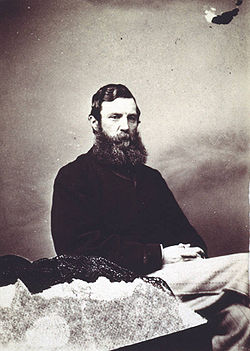Richard Dry
|
Sir Richard Dry KCMG |
|
|---|---|
 |
|
| 7th Premier of Tasmania | |
|
In office 24 November 1866 – 1 August 1869 |
|
| Preceded by | James Whyte |
| Succeeded by | James Milne Wilson |
| Personal details | |
| Born |
20 September 1815 Launceston, Van Diemen's Land |
| Died | 1 August 1869 (aged 53) Hobart, Tasmania |
| Spouse(s) | Clara Meredith |
Sir Richard Dry, KCMG (20 September 1815 – 1 August 1869) was an Australian politician, who was Premier of Tasmania from 24 November 1866 until 1 August 1869 when he died in office. Dry was the first Tasmanian-born premier, and the first Tasmanian to be knighted.
Dry was born in Launceston, Van Diemen's Land (now Tasmania), the son of Richard Dry, an officer and pastoralist, and his wife Anne, née Maughan. Dry was educated at a Kirkland's private school in Campbell Town. In 1835 Dry voyaged to Mauritius and the British ports in India, on his return to Tasmania he managed his father's property, Quamby Estate. He was made a magistrate in 1837, and was nominated to the Tasmanian Legislative Council in 1844. He resigned his seat with five others, who together became known as the "patriotic six", after a conflict with Governor Wilmot over the power of the Legislative Council. In 1848 the six resigning members were renominated to the council, and when the Council was reconstituted in 1851 Dry, who was then a leading member of the Anti-transportation League, was elected as a member for Launceston, defeating Adye Douglas.
When the Council met in 1851, Dry was unanimously appointed its Speaker and remained so for four years before resigning his seat in July 1855. Dry then took a long trip to Europe for health reasons. Dry returned to Tasmania in 1860, was elected to the Legislative Council in 1862, and on 24 November 1866 became premier and colonial secretary. During his time as Premier, Quamby Estate's Homestead became known as the “Government House of the North”. Dry had been much interested in the introduction of railways, was chairman of the Launceston and Deloraine Railway Association, and president of the Northern Railway League. His government succeeded in making some economies, introduced the Torrens real property act, and pushed the sale of crown lands.
...
Wikipedia
